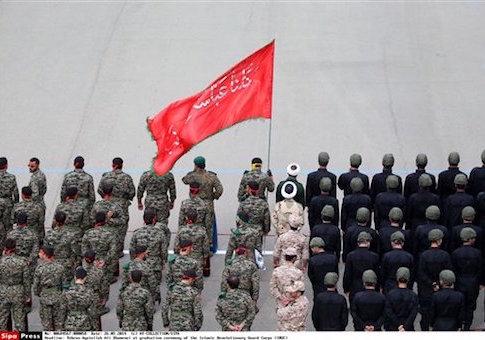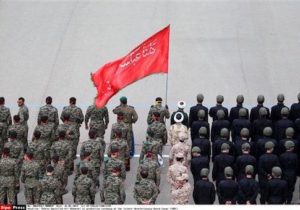
 By Contributing Author Cameron Keyani
By Contributing Author Cameron Keyani
WASHINGTON, DC, USA, August 5, 2017 /EINPresswire.com/ — Many American observers believe that the Iranian Revolution ended in 1979. For the Ayatollahs, and the Iranian Revolutionary Guard Corps (IRGC), this was when the Revolution began. For them, the revolution was less about regime change than about using the country and its resources to shape the world in the image of their fundamentalist ideology.
To the Ayatollahs of Iran, revolution is not a finite political event, but a pretext for their daily destabilizing campaigns for regional hegemony. Similarly, the un-revolutionary or non-Islamic label is used to justify their brutal suppression of anyone in Iran who steps out against the regime or engages in behavior that deviates from their so-called religious standards of moral cleanliness.
The IRGC was instrumental in the foundation of Hezbollah, and more recently has flexed its regional influence in sectarian conflicts in Syria and Yemen. Within Iran, the IRGC has sent countless Iranians and foreign nationals to grisly fates in the notorious Evin Prison, often on frivolous charges of espionage.
Congress has finally taken note of the threat that the IRGC poses to regional stability in the Middle East, and has targeted it for sanctions in H.R. 3364- Countering America’s Adversaries Through Sanctions Act. The House of Representatives bill, which had only three Nay votes, expanded upon Russia sanctions that passed the Senate 98-2.
The President reluctantly signed the legislation into law on August 2nd.
While the sanctions on Russia have dominated the headlines, the importance of substantive action against the IRGC cannot be understated. It is a step in the right direction for U.S. foreign policy and the promotion of human rights for people inside Iran
Recently, the Organization of Iranian American Communities (OIAC) held a briefing in the Hart Senate Office Building that examined the regional activities of the IRGC and possible next steps for curbing its destabilizing influence. The expert panel was moderated by Dr. Ramesh Sepehrrad of George Mason University.
The keynote speaker was Ambassador Robert Joseph, former Undersecretary of State for Arms Control and International Security, who spoke about the future of the Joint Comprehensive Plan of Action (JCPOA).
He noted that the Iran Deal lacks long term vision, lacks verification standards that would make it any more effective than the failed North Korean arms limitation deals of the early 2000s, and has not reduced the destructive regional influence of the IRGC any substantive way.
Ambassador Joseph was joined by in the panel by Washington Institute visiting fellow Nader Uskowi, Vice President of the American Foreign Policy Council Dr. Ilan Berman, and Hudson Institute fellows Michael Pregent and Lee Smith.
The panelists discussed the recent history of the IRGC, and next steps for the Trump administration and 115th Congress. Though they differed in opinions of the Iran Deal, they were unified in the sentiment that it had done nothing to curb the regional influence of the IRGC.
Specific concern was levied at Annex ii of the JCPOA, which delisted many members of the IRGC as targets of sanctions, including Quds Force commander Major General Qassem Soleimani. Soleimani and the IRGC have been instrumental in supporting Shia militants in Iraq and Syria, who have killed American soldiers and exacerbated the sectarian violence that lead to the rise of Daesh/ISIS.
The panelists agreed that H.R. 3364 was helpful in isolating the IRGC and curtailing its regional influence.
Needless to say, however, sanctions have serious limitations in curtailing the influence an organization like the IRGC, which the panelists warned has already trained tens of thousands of Shiite militias across the Middle East who can operate independently.
While no one advocated forcing regime change through military actions, the consensus was that isolating and hampering the IRGC would be a strategic boon for US interests in the Middle East and a major blow to the Islamic Republic’s ability to suppress protests and opposition to theocratic rule.
As Ambassador Joseph and Mr. Smith clarified– sanctions are a tool, not a strategy.
H.R. 3364 is a good start for countering the influence of the IRGC, but if the United States wants stability in the Middle East, the U.S. intelligence and diplomatic communities need a comprehensive plan to freeze their assets, neutralize the threat posed by their Shiite militias, and force U.S. regional partners to make a choice between doing business with America or doing business with the IRGC.
That choice should be easy and the result for the current regime in Iran well, devastating.
Cameron Keyani is a 23 year old Iranian American writer. Cameron is a graduate of St. Mary’s College of Maryland and has interned at the Woodrow Wilson Center as well as the U.S. House of Representatives. Mr. Keyani volunteers for the Organization of Iranian American Communities to help foster a community that makes informed decisions and confronts Islamic fundamentalism in the U.S., in Iran, and wherever it seeks to infiltrate.
U.S. Law: Iranian Revolutionary Guards are Terrorists
OIAC
202-876-8123

